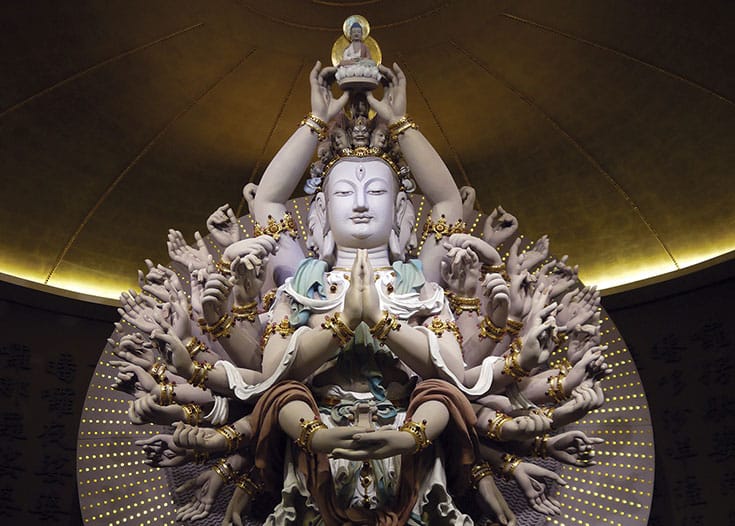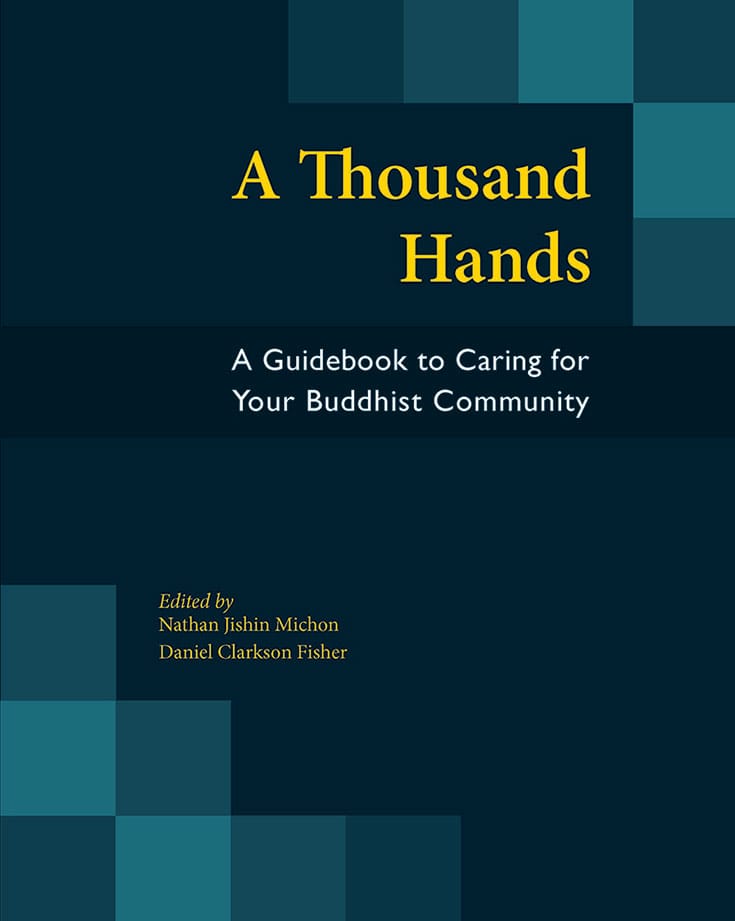Buddhism
Related: About this forumBuddhists Helping Buddhists
Pamela Ayo Yetunde reviews A Thousand Hands: A Guidebook to Caring for Your Buddhist Community, edited by Nathan Jishin Michon and Daniel Clarkson Fisher. From the Summer 2017 issue of Buddhadharma: The Practitioner’s Quarterly.

“Thousands Arms Thousands Eyes Guan Yin” by Loretta H. Yang, 2011
BY PAMELA AYO YETUNDE | MAY 16, 2017
Buddhists Helping Buddhists
BY PAMELA AYO YETUNDE| MAY 16, 2017
When we cannot cope with life as it is, and when we cannot function enough to provide basic care for ourselves, it would be a great comfort to know that our sanghas are communities we can rely on for guidance, help, and referrals. By engaging in right knowledge, wise understanding, and skillful responses, we can become communities of integrity—places of genuine, skillful care. A Thousand Hands: A Guide to Caring for Your Buddhist Community will challenge those who distrust the growing overlap between Buddhism and Western psychology and psychiatric medicine. But for the rest of us, this book can be a salve of cohesion, slowing the rotation of our sangha doors—doors that revolve due to people’s disappointments when their need for more sophisticated spiritual care goes unmet.
As Buddhist practitioners, we are invited to directly confront our own suffering and the existential crises of sickness, old age, and death. There’s no guarantee, however, that our practices, philosophy, or even Buddhist psychology will give us all the tools we need to meet the sufferings of others. But over the last couple of decades, as the Buddhist chaplaincy profession has grown in hospitals, hospice, the military, universities, and prisons, professional Buddhist chaplains and practitioners in Western psychotherapeutic professions have gained experience, knowledge, and skills in addressing such suffering, and it’s finding its way back into Buddhist communities. To that end, A Thousand Hands, edited by Nathan Jishin Michon and Daniel Clarkson Fisher, serves as a reference book, a resource for American Buddhist communities wanting to identify key issues, support individuals, and care for the sangha as a whole. The contributors—from a variety of backgrounds, including Buddhist chaplaincy, journalism, social work, psychology, marriage and family therapy, philosophy, and political activism—share their experiences specifically in service of Buddhist communities.
While the editors acknowledge that it’s impossible to include every human challenge in one book, their list of fifty topics is impressive: addiction, personal finance, bipolar disorder, cancer, domestic violence, managing team projects, grief, hospice, intrafaith considerations, and many more. In the chapter titled “Ministry of Presence,” interfaith chaplain and intercultural counselor Micka Moto-Sanchez explores the connection between the Buddhist practices of mindfulness and compassion with the practice of being present for those in the midst of a deep emotional crisis. Moto-Sanchez recalls an instance in which, as a new chaplain intern, she was called to attend to grieving parents whose child had died shortly after being born. Instead of seeing her sole responsibility as easing their grief, she took her role as a Christian to be that of a conduit of “transcendent power and grace.” Later reflecting on the experience, Moto-Sanchez realized that she was not there just to be a conduit but also to create a new dynamic with and for the grieving family; she came to understand that her presence and particular being mattered. In sangha situations in which people are grieving the loss of loved ones, other people may engage in loving-kindness and compassion meditation to be “conduits” for the dharma, unwittingly withholding actual spiritual care in the belief that they can somehow erase another person’s pain. Knowing one’s intentions for the encounter, having no heroic agenda, and being authentically compassionate are key to providing nurturing spiritual care within the sangha.
Many practitioners would say that Buddhism offers the promise of happiness. But where does that leave a practitioner suffering from clinical depression? Chaplain Alan Cossitt’s chapter outlines how to help people facing depression get appropriate medical treatment beyond Buddhist practices and should be required reading for anyone in a leadership or supporting role in a sangha. Cossitt, whose biography mentions his own struggles navigating depression and Buddhist practice, skillfully unpacks what constitutes depression according to the American Psychiatric Association’s Diagnostic and Statistical Manual, explaining the difference between depression and sadness and how to make appropriate referrals for medical treatment, especially when the depression is so severe that it gives rise to suicidal thoughts and intentions. He suggests that if sangha members are depressed, the community should skillfully help them accept how they feel, try not to let them isolate themselves, and provide a space for them to talk about their feelings, especially their suicidal feelings. If suicidal feelings and intentions are present, sanghas can encourage a depressed member to seek medical treatment, call a suicide hotline, or perhaps even take up mindfulness-based cognitive therapy. The sangha’s primary role, though, is to remain present when depressive isolating thoughts and behaviors begin to take hold.

“A Thousand Hands: A Guidebook to Caring for Your Buddhist Community”
Edited by Nathan Jishin Michon
and Daniel Clarkson Fisher
Sumeru Press, 2016
383 pages; $34.95
https://www.lionsroar.com/buddhists-helping-buddhists/
Tanuki
(16,388 posts)been participating in a program called Stephen Ministries:
https://en.m.wikipedia.org/wiki/Stephen_Ministries
..."The organization draws its name from St. Stephen. Since the days of the Apostles, caring ministry has been a hallmark of the Christian faith community.[2] Stephen is first mentioned in Acts of the Apostles as one of seven deacons appointed by the Apostles to distribute food and charitable aid to poorer members of the community in the early church.[Acts 6:5]
Stephen Ministry is a lay caregiving ministry that supplements pastoral care. The program teaches laypersons to provide one-on-one care for individuals who request support. The confidential care-giver and care-receiver relationship, usually conducted by weekly visits, may continue for months or years. Reasons for requesting a Stephen Minister’s visits may range from grieving the loss of a loved one, experiencing a major illness, going through a divorce, job loss, struggling with substance abuse, or other life difficulties.[3]
SM curriculum provides a formal, structured introduction to human psychology and peer-to-peer counseling. Curriculum materials, which draw on literature from pastoral counselors, Biblical scripture, theologians, and psychologists, cover such issues as assertiveness and honesty, healthy boundaries, confidentiality, and ways to proceed with referral to mental health professionals when appropriate.[4]
The central offices of Stephen Ministry are located in St. Louis, Missouri. Congregations which choose to participate in Stephen Ministry programming pay a fee to the central organization to cover the cost of intensive on-site training of lay leaders. These lay leaders then become instructors for the 50 hours of training for small groups of Stephen Ministers.[5] After this initial training is completed, Stephen Ministers participate in twice-monthly peer-to-peer supervision meetings. Supervision groups, which may be led by a pastor, are an essential component of support for and guidance to lay ministers.[1]
More than 12,000 congregations from 160 Christian denominations are now involved, and are located in the U.S., Canada, and 24 other countries.[4]".....(more)
rug
(82,333 posts)Stephen is also considered the first Christian martyr. Before his conversion, Paul was among those who stoned him.
WhiteTara
(31,236 posts)and we are a fairly close knit group. We have a study class each Thursday and usually have dinner together after class. We all act as support for one another.
rug
(82,333 posts)WhiteTara
(31,236 posts)at our house. Our teacher Geshe Dorjee will be here tonight. He's giving a very deep talk tonight on karma and the continuation of life.